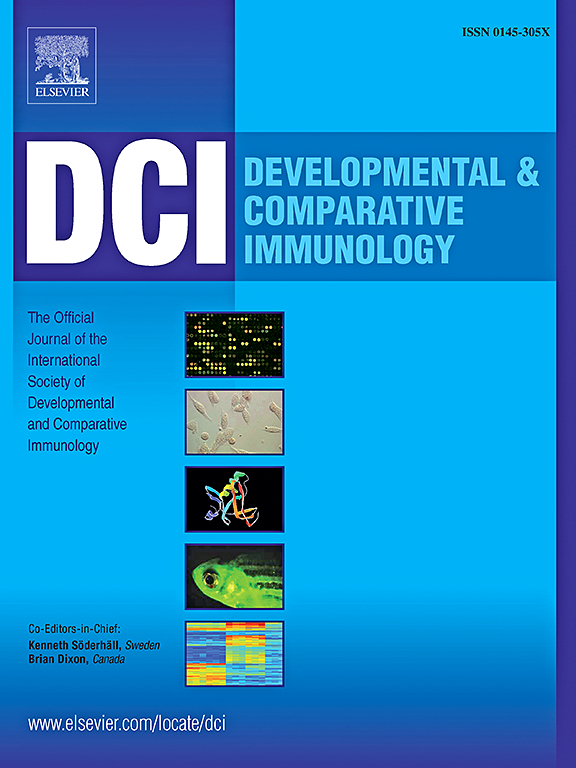Unveiling the immunomodulatory role of soluble chicken fractalkine: Insights from functional characterization and pathway activation analyses
IF 2.7
3区 农林科学
Q1 FISHERIES
引用次数: 0
Abstract
This study describes the first successful cloning and functional characterization of chicken CX3CL1, a chemokine involved in immune cell migration and inflammatory responses. Evolutionary analyses revealed its close relation to CX3CL1 from other avian species, particularly duck, turkey, and quail. Structurally, chicken CX3CL1 includes a signal peptide and a chemokine interleukin-8-like domain characterized by unique alpha-helices and disulfide bonds. Additionally, we produced and purified recombinant CX3CL1 protein and assessed its endotoxin levels. Chemotaxis assays revealed that CX3CL1 significantly enhances the migration of HD11 macrophages and CU91 T cells. Furthermore, recombinant CX3CL1 induced the expression of pro-inflammatory cytokines (TNF-α, IFN-β, IFN-γ, IL-6, and CCL20) in a time-dependent manner, while exerting differential effects on anti-inflammatory cytokines (IL-4, IL-10). Conversely, transfection with siCX3CL1 or siCX3CR1 led to the downregulation of these responses. We also observed activation of the MAPK, NF-κB, and JAK/STAT pathways, evidenced by increased phosphorylation of key signaling molecules. These findings underscore the crucial role of chicken CX3CL1 in regulating immune responses, cell migration, and the activation of key signaling pathways. This study provides valuable insights into the immunomodulatory functions of soluble CX3CL1, highlighting its potential as a therapeutic target for inflammatory conditions and enhancing our understanding of immune cell dynamics.
揭示可溶性鸡分叉蛋白的免疫调节作用:功能表征和通路激活分析的启示
本研究首次成功克隆并描述了鸡 CX3CL1 的功能特征,鸡 CX3CL1 是一种参与免疫细胞迁移和炎症反应的趋化因子。进化分析表明,鸡 CX3CL1 与其他禽类物种(尤其是鸭、火鸡和鹌鹑)的 CX3CL1 关系密切。从结构上看,鸡 CX3CL1 包括一个信号肽和一个类似白介素-8 的趋化因子结构域,该结构域以独特的α-螺旋和二硫键为特征。此外,我们还生产并纯化了重组 CX3CL1 蛋白,并评估了其内毒素水平。趋化试验显示,CX3CL1 能显著增强 HD11 巨噬细胞和 CU91 T 细胞的迁移。此外,重组 CX3CL1 还能以时间依赖的方式诱导促炎细胞因子(TNF-α、IFN-β、IFN-γ、IL-6 和 CCL20)的表达,同时对抗炎细胞因子(IL-4、IL-10)产生不同的影响。相反,转染 siCX3CL1 或 siCX3CR1 会导致这些反应下调。我们还观察到 MAPK、NF-κB 和 JAK/STAT 通路的激活,关键信号分子的磷酸化增加就是证明。这些发现强调了鸡 CX3CL1 在调节免疫反应、细胞迁移和激活关键信号通路中的关键作用。这项研究为可溶性 CX3CL1 的免疫调节功能提供了宝贵的见解,凸显了其作为炎症治疗靶点的潜力,并增进了我们对免疫细胞动态的了解。
本文章由计算机程序翻译,如有差异,请以英文原文为准。
求助全文
约1分钟内获得全文
求助全文
来源期刊
CiteScore
6.20
自引率
6.90%
发文量
206
审稿时长
49 days
期刊介绍:
Developmental and Comparative Immunology (DCI) is an international journal that publishes articles describing original research in all areas of immunology, including comparative aspects of immunity and the evolution and development of the immune system. Manuscripts describing studies of immune systems in both vertebrates and invertebrates are welcome. All levels of immunological investigations are appropriate: organismal, cellular, biochemical and molecular genetics, extending to such fields as aging of the immune system, interaction between the immune and neuroendocrine system and intestinal immunity.

 求助内容:
求助内容: 应助结果提醒方式:
应助结果提醒方式:


